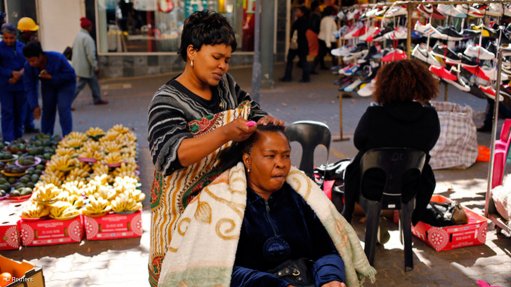
Photo by: Reuters
Lack of funding is one of the major challenges in the development of micro enterprises in sub-Saharan Africa. One of the ways small business holders survive is by belonging to informal interdependent societies.
The availability of finance is necessary for small business development and players in the market often use informal avenues. These include friends and family, moneylenders and informal savings schemes such as Esusu in West Africa and stokvels in South Africa.
Esusu operate as a savings group, an insurance scheme and an avenue for social interaction. The scheme operates under a trustworthy leader who manages a fixed contribution that is shared among members based on rotation. The membership size, amount contributed and interval are usually agreed on by members.
These groups aid social interaction, give financial support and expose members to business opportunities due to their interdependent nature.
David Harper explains this extensively in his book on entrepreneurship and development. He argues that interdependent societies support economic development and cites Berber (Morocco), Yoruba (Nigeria), Akan (Ghana), and Kikuyu (Kenya) as examples of interdependent societies with entrepreneurial traits. He describes them as such because groups of people save together, and entrepreneurs have access to finance.
The benefits of informal saving schemes
Esusu is a financial or credit institution based on rotation with different variations. It is popular among the Yoruba in Nigeria and Benin, the Akan of Ghana, and the people of African descent in Trinidad and Tobago, Bahamas, Cuba and Brazil.
Members contribute an amount that is agreed on at weekly or monthly meetings and a ballot is used to decide the individual who will be the recipient of the contribution. For instance, if there are 10 members in a group and each contributes US$10, the recipient will receive $100. The rotation will continue until all members get paid after which the Esusu is dissolved. Members can restart the scheme all over again. The Hausas call the same scheme Adachi which is synonymous with the Akans' Susu in Ghana.
The challenges with Esusu include:
-
the need for a trustworthy leader,
-
members can only get what they contribute, although there can be an advance, and
-
sustainability.
Notwithstanding these challenges, sub-Saharan African entrepreneurs reduce their risk by belonging to more than one interdependent social group.
These informal savings arrangements are great, but they only go so far. Credit societies can help.
The role of credit societies
Cooperative thrift and credit societies can address some of the shortcomings of Esusu. These are member-based organisations that help members to address economic problems. The ultimate goal is to encourage thrift among the members and to meet the credit needs of people who might otherwise be exposed to exploitation. Members are known for strong commitment and participation in decision making.
These societies mobilise local savings and administer credit to members, thereby encouraging thrift and entrepreneurial activity. They have relatively simple administrative processes and transaction costs are small and shared. Interest income from loans and return on investments may either be distributed to the members or reinvested in the society within a given period.
These have made micro entrepreneurs in some countries in sub-Saharan Africa competitive. I have witnessed this among the cocoa farmers and agricultural processors in southwestern Nigeria.
A study of micro entrepreneurs in Nigeria indicates that individuals who belong to these societies have higher personal agency and belief in themselves. They believe that they are competent and that their actions can lead to desired outcomes such as better access to credit and increased micro enterprise performance in the form of growth, revenue, profitability and number of employees.
In other words, these societies give more than credit facilities to members. They create a learning environment by giving technical support and aiding improved social interaction. They can deliver these services because:
-
They have both formal and informal attributes and are registered and recognised by the government.
-
Members contribute what they can afford and their savings and reputation serve as their collateral.
-
There are usually social ties among members which makes it difficult for people to abscond from the repayment of their loans.
-
Members can borrow twice or three times the amount they have in savings. The modality depends on the society.
-
The interest rate is 5% and is deducted before the applicant receives the loan. Loan recipients are usually given a year to repay their debt. The recipient can continue to save while repaying the debt or take a break from savings till repayment is completed.
-
They invest in other business ventures and do profit sharing at the end of the year based on the share of each member. Although decision making is based on one vote per person, profit sharing is based on contribution.
-
Small is beautiful. When a society starts getting big, say more than 50 members, a union is formed with sub-groups forming societies.
-
It is difficult for micro entrepreneurs to differentiate consumption from production loans because of the nature of their businesses and families. The societies allow them to use the money the way they want once they are willing and able to repay.
Financial inclusion will be achievable in sub-Saharan Africa if governments encourage the formation of these societies. Laws must be developed to resolve conflicts in the case of dubious executives or members who are struggling to repay their loans due to unforeseen circumstances.
The promotion of these societies will create the financial, technical and social support required by micro entrepreneurs – a necessity for the diversification of the economy of most countries in sub-Saharan Africa.
![]() Written by Bamidele Adekunle, Contract Faculty, Ted Rogers School of Management, Ryerson University; SEDRD Adjunct Professor, University of Guelph
Written by Bamidele Adekunle, Contract Faculty, Ted Rogers School of Management, Ryerson University; SEDRD Adjunct Professor, University of Guelph
This article was originally published on The Conversation. Read the original article.